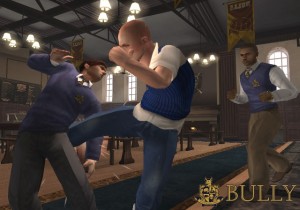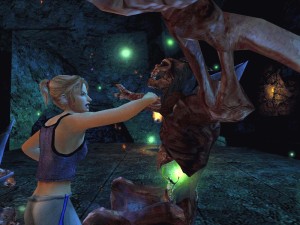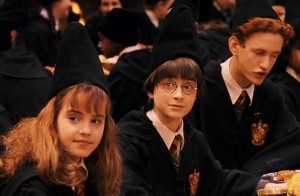 A while ago I was talking to Director of Design Richard Rouse along with some of the other Midway studio creative directors about our experiences with Bully. In my case, I really wanted to like it, but only played a few hours before giving up. Since it was blessed with many high reviews (the Gamerankings score settled at around 87%), I was left wondering… “What am I missing?” While we’re always in favor of immersing ourselves in new experiences and gameplay, there’s something about it that wasn’t clicking:
A while ago I was talking to Director of Design Richard Rouse along with some of the other Midway studio creative directors about our experiences with Bully. In my case, I really wanted to like it, but only played a few hours before giving up. Since it was blessed with many high reviews (the Gamerankings score settled at around 87%), I was left wondering… “What am I missing?” While we’re always in favor of immersing ourselves in new experiences and gameplay, there’s something about it that wasn’t clicking:
- Boarding school culture: While the setting may be attractive to 30-something English males (as Simon Woodroffe of Midway Newcastle and Creative Director of Wheelman) pointed out with mentions of Billy Bunter, Jennings, and Ripping Yarns), as Americans we don’t really share the familiarity (hell, I’d never heard of any of those). Not only is the setting something we can’t identify with, it feels more like the world is a conservative culture reminiscent of the 1950’s, but with none of the music or nostalgia to go with it.
- Class attendence: For me, what gave me the most negative reaction in Bully is the requirement of attending class. Racing to get to class on time is something I didn’t particularly enjoy 20 years ago, so I don’t particularly want to do in a game. If the class activities were more integrated with the regular gameplay, it might have been a bit better, but what bothered me was being forced into a schedule. Constantly being hounded to get to class or that told that I’m violating curfew (and having to avoid the “enforcers†as a result) distracted me from the simple pleasures of exploration (a critical component for open-world games). Since running across campus took nearly the entire couple of “hours†you had between classes, I always felt under the gun. In fact, it reminded me of GUN in a way, which kept pushing me to finish the story rather than have my own fun. A batter choice would have been to drop the player off at the school a week before classes began, to remove some of the schedule and population density while you get your feet wet.
 Unattractive lifestyle: While it was generally done for laughs, the characters you deal with early on are all complete losers… You have to help the nerd to the bathroom so that he doesn’t wet himself, you date the ugliest girl in school… your only “friend†is a totally unappealing jerk. In the end, this was enough of a turnoff that I just stopped playing. From trailers and the like it seemed apparent that there was “better stuff†to build up to, but the game did not taunt me with them at all… I never met any cool people, and even attractive women weren’t anywhere to be seen. Bullworth Academy just didn’t position itself to be a place that I wanted to become the king of.
Unattractive lifestyle: While it was generally done for laughs, the characters you deal with early on are all complete losers… You have to help the nerd to the bathroom so that he doesn’t wet himself, you date the ugliest girl in school… your only “friend†is a totally unappealing jerk. In the end, this was enough of a turnoff that I just stopped playing. From trailers and the like it seemed apparent that there was “better stuff†to build up to, but the game did not taunt me with them at all… I never met any cool people, and even attractive women weren’t anywhere to be seen. Bullworth Academy just didn’t position itself to be a place that I wanted to become the king of.
 Harvey Smith of Midway Austin (and Creative Director of Area 51: Blacksite) rightfully pointed out that high school has been a successful setting of great things like Buffy the Vampire Slayer and the Ultimate Spiderman comics. Richard noted that the high school of Buffy was populated by attractive, always-witty teenagers that killed freakin’ vampires. Those California high schools you see in TV and movies are probably some of the most idealized environments you’ll ever see.
 The comparison was also drawn with Harry Potter, which also depicted a “traditional†English boarding school. However, to me the appeal of Harry Potter in its earliest installments (in particular The Sorceror’s/Philosopher’s Stone) was the fact that while Harry was placed in a traditional kid’s horror scenario (first day in a new, unfamiliar school) he succeeds in ways that kids could only dream of:
The comparison was also drawn with Harry Potter, which also depicted a “traditional†English boarding school. However, to me the appeal of Harry Potter in its earliest installments (in particular The Sorceror’s/Philosopher’s Stone) was the fact that while Harry was placed in a traditional kid’s horror scenario (first day in a new, unfamiliar school) he succeeds in ways that kids could only dream of:
- The Center of Attention: Harry was unique and special, and everyone knew it. Kids admired him, and most teachers liked him too. People knew who he was, which paved the way for his ongoing special treatment.
- A Low level of Conflict and Tension: In the early stories, any negative situation didn’t last long. While most tales in a school setting end the second act with a moment where the main character is suddenly taken out of his or her comfort zone (oh no, the bully has the upper hand, the cute girl is laughing at him/her), in Harry Potter, there is no extended moment of tension. Even the clear antagonists don’t get the upper hand for very long.
- Frequent Success: Harry is a natural champion at sports, and manages to succeed in class without really “tryingâ€â€¦ either through luck or magical destiny, his success is fated to be. He even has the best “car†in the form of his pimped-out witches’ broom.
I certainly can’t discount the fact that Harry Potter has very clever writing and appeals to a wide age group, but when you compare school tales like Bully to those of Harry Potter, you can see that there is a lot that makes kids love those stories.
